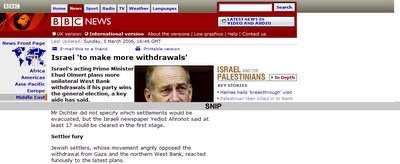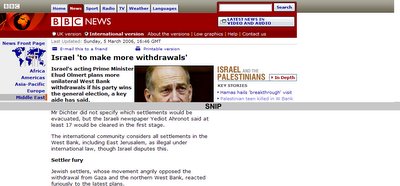BBC News has published an article entitled
Europe's angry young Muslims, in which one can read the following.
Europe is home to a new generation of alienated young Muslims whose anger may turn to radicalism, the BBC's Islamic affairs analyst Roger Hardy finds in new three-part series.
…
Voices of alienation
…
Is a new angry, alienated generation of European Muslims now being drawn to radicalism?
How typical of the BBC to speak of the “alienation” of European Muslims and
to ask the opinion of several young smiling “moderates” (one of them asking: “When was the last time Muslims were shown in a positive light?” How about: “
The last time the BBC updated its website”?), turning a blind eye on the reasons for which they are alienated.
In the article, the example of France is given.
In the suburbs on the northern rim of the French capital, I found young Muslims, from Arab and African families, who feel excluded by the French state.
When during the riots President Chirac belatedly intervened, telling the people of the suburbs they were all sons and daughters of the French republic, many of them saw it as a bad joke.
France, unlike Britain, tries to keep religion out of public life. Everyone is supposed to be equal, regardless of cultural background.
Try telling that to Ali, who is 24 and unemployed.
"France has betrayed the young people of the suburbs. When you're called Ali you can't get a job. The French don't accept Islam. Politicians promise us mosques and so on, but at the same time they smear us and call us terrorists."
How about asking some of the French why they are hostile to Muslims? Could it be due to the
gang rapes, the
vandalism and
so on? I heard a French taxi driver on television the other day say that he no longer took Muslims, because he was exasperated that they didn’t pay the fee. As much as the BBC would like it not to be the case, the alienation of European Muslims has been brought upon them because of the behaviour of some of the community’s members, not because Europeans are intrinsically bigoted.











